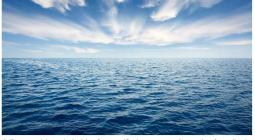The World’s Oceans Are a ‘Ticking Time Bomb,’ Reaching Dangerous Acidification Levels Earlier Than Scientists Thought
Ocean acidification has crossed “planetary boundaries” in some parts of the ocean, deepening a crisis facing the planet’s marine ecosystems.
A critical measure of the ocean’s health suggests that the world’s marine systems are in greater peril than scientists had previously realized and that parts of the ocean have already reached dangerous tipping points.
A study, published Monday in the journal Global Change Biology, found that ocean acidification—the process in which the world’s oceans absorb excess carbon dioxide from the atmosphere, becoming more acidic—crossed a “planetary boundary” five years ago.
“A lot of people think it’s not so bad,” said Nina Bednaršek, one of the study’s authors and an assistant professor of senior research at Oregon State University. “But what we’re showing is that all of the changes that were projected, and even more so, are already happening—in all corners of the world, from the most pristine to the little corner you care about. We have not changed just one bay, we have changed the whole ocean on a global level.”
The new study, also authored by researchers at the U.K.’s Plymouth Marine Laboratory and the National Oceanic and Atmospheric Administration (NOAA), finds that by 2020 the world’s oceans were already very close to the “danger zone” for ocean acidity, and in some regions had already crossed into it.
Scientists had determined that ocean acidification enters this danger zone or crosses this planetary boundary when the amount of calcium carbonate—which allows marine organisms to develop shells—is less than 20 percent compared to pre-industrial levels. The new report puts the figure at about 17 percent.
“Ocean acidification isn’t just an environmental crisis, it’s a ticking time bomb for marine ecosystems and coastal economies,” said Steve Widdicombe, director of science at the Plymouth lab, in a press release. “As our seas increase in acidity, we’re witnessing the loss of critical habitats that countless marine species depend on and this, in turn, has major societal and economic implications.”
Scientists have determined that there are nine planetary boundaries that, once breached, risk humans’ abilities to live and thrive. One of these is climate change itself, which scientists have said is already beyond humanity’s “safe operating space” because of the continued emissions of heat-trapping gases. Another is ocean acidification, also caused by burning fossil fuels.
In 2023, researchers determined that six of these boundaries had already been crossed. The new research adds a worrying seventh.
The study, which was based on measurements from ice cores and data models, found that the acidity of the ocean was worse in deeper waters. At about 200 meters below the ocean’s surface, 60 percent of the ocean’s waters had already crossed the 20-percent threshold, compared to about 40 percent at the ocean’s surface.
“Most ocean life doesn’t just live at the surface—the waters below are home to many more different types of plants and animals,” said Helen Findlay, a biological oceanographer with the Plymouth lab and lead author of the new study “Since these deeper waters are changing so much, the impacts of ocean acidification could be far worse than we thought.”
The ocean’s increasing acidity has already led to tropical and subtropical reefs losing more than 40 percent of their habitats. In polar regions, sea butterflies—a crucial component of marine food webs—have lost more than 60 percent. Coastal shellfish species have lost 13 percent of the habitats in which they can function.
“The previous documentation on ocean and planetary boundaries for ocean acidification had suggested we were close to but did not exceed the boundary yet,” said Richard Feely, a NOAA oceanographer and co-author of the study. “What this report says is that when you consider the subsurface waters—and in particular when you consider the environments where there is tremendous sensitivity to ocean acidification—the high latitude polar regions and the upwelling regions on the West Coast—those regions have seen tremendous impact.”
Feely noted that these regions tend to be the ocean’s most productive.
The study comes as the top ocean policy and marine researchers gather in France for the United Nations Ocean Conference to address the worsening crisis facing the world’s oceans, from plastic pollution to deep-sea mining.
“We live in times where studies like this are not making an immediate impact on policy anymore, which is unfortunate,” Bednaršek said. “But I think it’s extremely important to document these changes, and hopefully this will have an impact on policy and politics.”
Cover photo: A woman stands with a bucket of mussels in front of the sea at Magoito Beach in Portugal. Credit: Patricia De Melo Moreira/AFP via Getty Images



